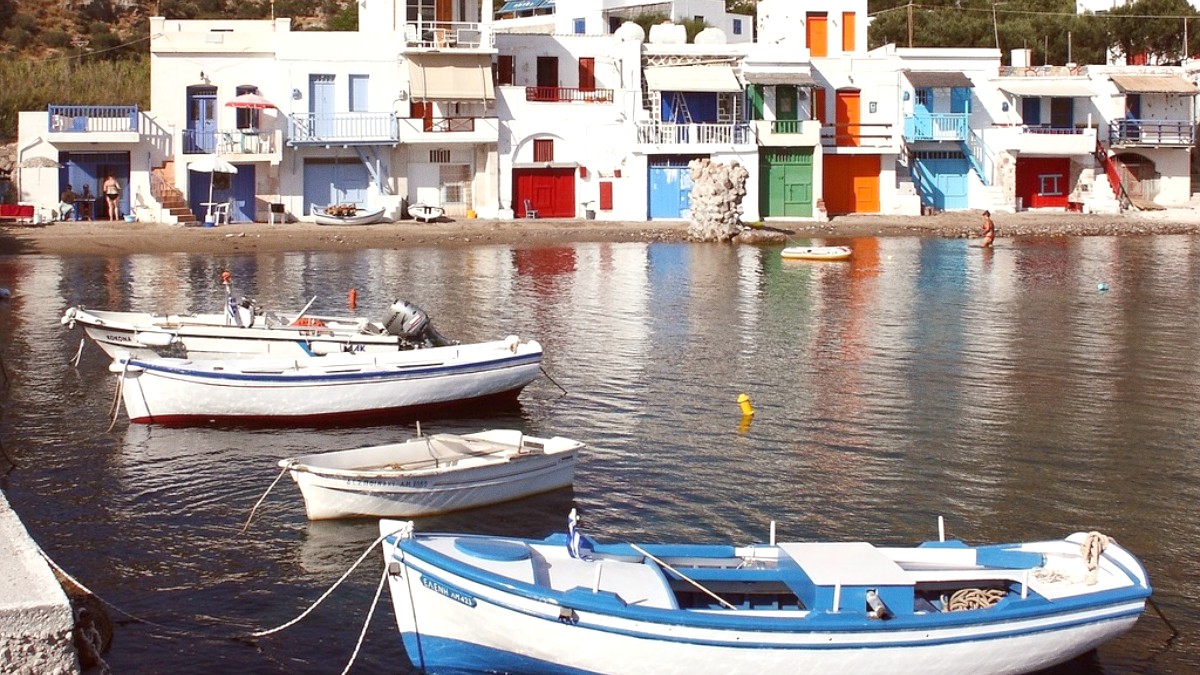
Greece
Temperature Ranges: Spring (April-May): 15-22°C (59-72°F). Days are pleasantly warm, evenings cool. Summer (June-August): 25-30°C (77-86°F), often higher. Sun intense. Autumn (September-October): 20-25°C (68-77°F). Sea retains warmth. Evenings cool. Winter (November-March): 10-15°C (50-59°F). Cooler air.
Precipitation: Milos receives most rainfall from November to March. Summers are dry. Humidity: Generally moderate. Wind: "Meltemi" winds prevalent in July and August. They are strong, dry northerly winds. They create a cooling breeze. For boat tours, strong Meltemi winds can lead to cancellations or route changes.
Beach and Swimming: June to September for warmest sea temperatures and reliable sunny weather. Early June and late September balance warmth and fewer crowds.
Hiking and Exploration: April, May, September, and October for cooler, comfortable temperatures. Boat Tours: May to early October. For calmest seas and reliable schedules, early June or September are often good, as Meltemi winds are typically less intense.
Peak travel, high costs.
Hottest weather for swimming and sunbathing. All services operate fully.
Crowded beaches. Highest prices. Strong Meltemi winds. Book far in advance.
Balance of weather and crowds.
Pleasant temperatures for activities. Fewer crowds. Lower prices. Most services operate.
Water cool in early May. Some services close by late Oct. Ferry schedules slightly reduced.
Quietest, lowest prices.
Lowest prices. Quietest time. Lush green landscapes. Cultural exploration without crowds.
Many businesses closed. Limited ferry schedules. Cooler weather, rain chance. Limited boat tours.
If warm water and a lively atmosphere are priorities, consider July or August. These months have peak sunshine and all tourist activities operating at full capacity.
For a balance of pleasant weather, fewer crowds, and better value, the shoulder seasons (May, early June, or September) offer a relaxed and equally rewarding experience.
Book well in advance for high season.
Secure ahead, especially for popular routes.
Always check forecasts, especially for boat tours and ferry travel.
Meltemi winds can affect comfort on exposed beaches and sea conditions.
Expect more closures in low season.
Greece is part of the Schengen Area, which simplifies travel for many nationalities.
Citizens from countries outside the European Union (EU), European Economic Area (EEA), or Switzerland generally need a Schengen Visa for stays up to 90 days within any 180-day period. This visa covers tourism, business, and short visits. Application at the embassy or consulate of your main destination country.
Many nationalities, including citizens of the United States, Canada, Australia, the United Kingdom, Japan, and South Korea, enter Greece visa-free for short stays. These stays are limited to 90 days within any 180-day period. This period resets after you have been outside the Schengen Area for 90 consecutive days.
The currency in Greece, including Milos, is the Euro (€). ATMs are widely available in Adamas, Plaka, and Pollonia. Most hotels, larger restaurants, and main shops accept credit and debit cards. Smaller tavernas and local shops may prefer cash.
Milos has options for various travel styles, from budget-conscious to luxury experiences.
Daily averages for a single traveler, excluding flights to/from Milos. Couples or groups may find some costs more economical per person.
Budget Traveler: €55-€130 (hostel, street food, bus, free activities). Mid-Range Traveler: €140-€320 (mid-range hotel, local tavernas, scooter/ATV, some tours). Luxury Traveler: €390+ (boutique hotel, fine dining, rental car/private tours).
Prices fluctuate significantly by season. Booking in advance usually locks in better rates.
Budget: Hostel bed, basic guesthouse.
Luxury: Villas, high-end resorts.
Local tavernas and street food offer economical options. Tourist-focused restaurants are higher-priced.
Budget: Gyros/Souvlaki, self-catering meals.
Luxury: Fine dining, gourmet seafood, cocktails.
Public bus is the most economical. Rentals offer independence.
Budget: Local bus, walking.
Luxury: Rental car, private transfers, private boat tours.
| Category | Expectation | Notes |
|---|---|---|
| Restaurants | Round up or 5-10% for good service. | 10-15% for exceptional service. Cash for tip if card payment. |
| Taxis | Round up to the nearest Euro. | E.g., €7.50 to €8. |
| Hotel Staff | Small tip appreciated. | €5-€10 for housekeepers (few nights), €1-€2 for bellhops. |
A look at Milos health and safety information.
No specific vaccinations for Greece entry. Routine vaccinations up to date. Hepatitis A and Typhoid advised if eating street food or in rural areas.
Tap water generally safe. Many prefer bottled water due to taste or caution.
Standards generally good. Choose busy establishments.
Prevention is
Sunburn and Heatstroke: Use High-SPF sunscreen, Wide-brimmed hats, sunglasses. Seek shade. Dehydration: Drink plenty of Bottled water. Gastrointestinal Issues: Good hand hygiene. Sea Urchins: Wear Water shoes on rocky beaches. Insect Bites: Use Insect repellent.
Recognize symptoms like dizziness or fatigue for dehydration. If stung by sea urchin, apply vinegar or hot water and carefully remove spines. Mosquitoes can be a nuisance from late spring through early autumn; wear long sleeves at dusk, use repellent.
Always consult a healthcare provider before travel for personalized advice.
Milos has a local health center (Polykliniki) in Adamas. It offers basic medical care. For serious emergencies, evacuation to a larger island or Athens may be needed.
Several pharmacies (farmakeio) operate in Adamas, Plaka, and Pollonia. Pharmacists offer advice and over-the-counter medications. Look for a green cross sign.
European Emergency: 112 (connects to ambulance, police, fire). Ambulance: 166. Police: 100. Fire Department: 199.
Crime Rate: Milos is a very safe island with a low crime rate. Violent crime is rare. Petty Theft: Uncommon, but practice general awareness. Do not leave bags unattended on beaches. Safety by Neighborhood: Main villages are very safe. Exercise caution on remote beaches or trails, especially alone or after dark.
Be mindful of strong sun and potential dehydration. Wear water shoes on rocky beaches to protect against sea urchins. Carry a fully charged phone, especially when exploring isolated areas.
Keep valuables secure and out of sight, especially in crowded port areas.
Pay attention to local warnings regarding wildfires or strong winds.
Know your country's embassy or consulate location in Athens for lost passports or emergencies.
People relaxing on a beautiful beach in Milos.